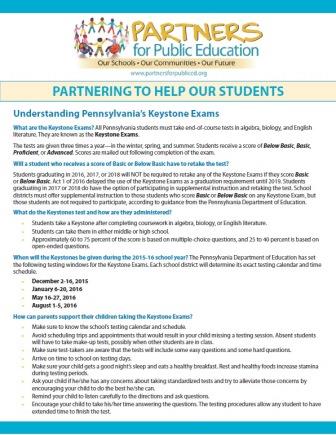
Understanding Pennsylvania’s Keystone Exams
Download a PDF Version of Understanding Pennsylvania’s Keystone Exams
Updated: September 2022

What are the Keystone Exams? All Pennsylvania students must take end-of-course tests in algebra, biology, and English literature. They are known as the Keystone Exams.
The tests are given three times a year — in the winter, spring, and summer. Students receive a score of Below Basic, Basic, Proficient, or Advanced. Scores are mailed out following completion of the exam.
Will a student who receives a score of Basic or Below Basic have to retake the test?
Students graduating in 2017 or 2018 will NOT be required to retake any of the Keystone Exams if they score Basic or Below Basic. Act 1 of 2016 delayed the use of the Keystone Exams as a graduation requirement until 2019. Students graduating in 2017 or 2018 do have the option of participating in supplemental instruction and retaking the test. School districts must offer supplemental instruction to those students who score Basic or Below Basic on any Keystone Exam, but those students are not required to participate, according to guidance from the Pennsylvania Department of Education.
What do the Keystones test and how are they administered?
- Students take a Keystone after completing coursework in algebra, biology, or English literature.
- Students can take them in either middle or high school.
- Approximately 60 to 75 percent of the score is based on multiple-choice questions, and 25 to 40 percent is based on open-ended questions.
When will the Keystones be given? The Pennsylvania Department of Education has set the following testing windows for the Keystone Exams. Each school district will determine its exact testing calendar and time schedule.
How can parents support their children taking the Keystone Exams?

- Talk to your children about the test and any concerns they may have.
- Remind your child he or she is more than a test score.
- Make sure you know the school’s testing calendar and schedule.
- Avoid scheduling trips and appointments that would result in your child missing a testing session.
- Make sure your child gets a good night’s sleep and eats a healthy breakfast.
- Make sure your child arrives on time to school on testing days.
- Make sure test-takers are aware that the tests will include some easy questions and some hard questions.
- Remind your child to listen carefully to the directions and ask questions.
- Encourage your child to take his/her time answering the questions. The testing procedures allow any student to have extended time to finish the test.
Do the Keystones replace the PSSAs?
The Keystone Exams replace state tests for 11th-graders known as the Pennsylvania System of School Assessment, or PSSAs. Students will continue to take the PSSAs in grades 3 through 8.
Will Keystone Exam scores be recorded in a student’s transcript?
Yes. Beginning in the 2016-2017 school year, the highest performance level attained by a student on each of the Keystone Exams will be reflected in that student’s transcript.
Will students get help to improve their scores?
School districts must offer supplemental instruction to students graduating in 2017 or 2018 who score Basic or Below Basic on any subject of a Keystone. Those students do not have to retake the Keystone Exam, but may choose to retake the exam after participating in supplemental instruction provided by the school district.
A parent whose child scores Below Proficient should set up a meeting with the school to:
- Find out what options the district has for remediation;
- Share your concerns with the district; and
- Engage your child in the process.
Parents should be prepared to ask what options their child has. Pennsylvania leaves it up to each school district to create its own process to help students achieve success on the Keystones.
Here are some questions and requests to take with you to the school meeting:
- How did my child handle the testing room and exam?
- How does remediation impact my child’s future course offerings? Does it reduce the number of electives my child can take?
- Has my child had training in test-taking strategies?
- How long will my child be in remediation? How will I get feedback from the teacher?
- When can my child take this Keystone Exam again?
- What can I do as a parent to help my child prepare?
- I would like to meet with the remediation teacher to set up a line of communications and be part of the team assisting my child.
- Can I have a copy of the book or other resources to help my child prepare at home?
- Will my child be able to work with peers who scored Proficient or higher on the Keystone Exams?
- How does the school staff assess my child’s current skill set for the other Keystone Exams?
May a student complete a project-based assessment?
A school district may use a project-based assessment as part of its supplemental instruction program. If offered, it will be locally scored, and a successfully completed project may be used by the district to determine that a student is proficient for transcript purposes.
Paid for by PSEA
Copyright © 2023 PSEA. All rights reserved.